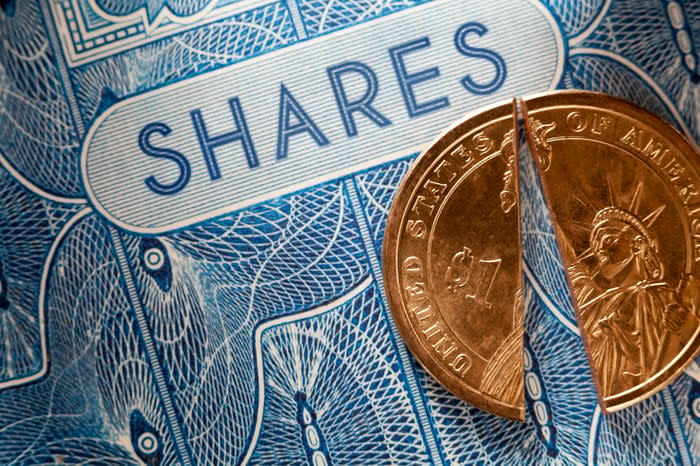Move Over, Nvidia and Broadcom: Wall Street's 2 Newest Stock-Split Stocks Are Taking Center Stage This Week
Although artificial intelligence (AI) has been the talk of Wall Street for much of the last two years, the euphoria surrounding companies enacting stock splits has been an equally important catalyst for the stock market in 2024.
A stock split is a tool publicly traded companies have at their disposal that allows them to cosmetically alter their share price and outstanding share count by the same magnitude. It's cosmetic in the sense that stock splits have no impact on a company's market cap or its underlying operating performance.
There are two classes of stock splits, one of which investors gravitate to far more than the other. Reverse-stock splits have a goal of increasing a company's share price, often to ensure continued listing on a major stock exchange. Comparatively, forward-stock splits reduce a company's share price, usually with the purpose of making shares more nominally affordable for retail investors and/or employees.

Image source: Getty Images.
Whereas reverse-stock splits are usually undertaken from a position of operating weakness, companies conducting forward splits are typically out-executing their competition and on the leading edge of the innovative curve within their respective industry. Long story short, investors often flock to companies completing forward-stock splits.
Since 2024 began, 13 exceptional businesses have announced or completed a stock split, 12 of which are of the forward-split variety. While none of these are probably better-known than AI leaders Nvidia (NASDAQ: NVDA) and Broadcom (NASDAQ: AVGO), the attention this week turns to Wall Street's two newest members of the stock-split club.
Nvidia and Broadcom were Wall Street's most-anticipated stock splits
The hype surrounding AI is so thick investors could arguably cut it with a knife. Since the start of 2023, shares of Nvidia have skyrocketed by 639%, as of the closing bell on Sept. 3, with Broadcom rising by a not-too-shabby 173%. Such monstrous gains coerced Nvidia to complete a 10-for-1 forward split in early June, while Broadcom conducted its first-ever split, also of the 10-for-1 variety, in mid-July.
The fuel behind Nvidia's epic run that saw it, at least briefly, become the largest publicly traded company is its top-tier graphics processing units (GPUs). The company's H100 GPU is the preferred choice in AI-accelerated data centers.
More importantly, demand for the H100 and successor Blackwell platform, which is set to make its debut in the early part of 2025, are backlogged. When demand for a product handily outstrips its supply, the price of that good tends to climb. The H100 GPU typically costs between 100% to 200% more than Advanced Micro Devices' MI300X AI-GPU. For Nvidia, this has led to a sizable uptick in its gross margin since 2023 began.
As for Broadcom, it's stepped up as the preferred provider of AI networking solutions. The Jericho3-AI fabric, which was introduced in the second quarter of 2023, is able to connect up to 32,000 GPUs in high-compute data centers. The goal for Broadcom's solutions is to reduce tail latency and help businesses get as much computing capacity as possible out of their GPUs.
However, Broadcom has a considerably more diverse revenue stream than Nvidia. It's one of the leading providers of wireless chips and accessories used in 5G-capable smartphones, and provides a wide assortment of optical components and networking solutions to industrial and automotive companies.
But Nvidia and Broadcom have had their moment in the spotlight as stock-split stocks. This week, two new companies are set to take center stage.

Image source: Sirius XM.
Sirius XM Holdings
One of Wall Street's newest stock-split stocks, and the only one of the 13 set to complete a reverse split, is satellite-radio operator Sirius XM Holdings (NASDAQ: SIRI).
Sirius XM is the final inning of its merger with Liberty Media's Sirius XM tracking stock, Liberty Sirius XM Group (NASDAQ: LSXMA)(NASDAQ: LSXMB)(NASDAQ: LSXMK), which is expected to stop trading after the closing bell on Sept. 9. This merger is being undertaken to create a unified class of Sirius XM common stock.
Upon completion of this merger -- i.e., following the close of trading on Sept. 9 -- Sirius XM will conduct a 1-for-10 reverse-stock split.
Although I did note that reverse splits are usually undertaken from a position of operating weakness, this isn't the case with Sirius XM, which is in danger of delisting. The company has approximately 3.85 billion outstanding shares, which has held its share price firmly in the mid-single digits for over a decade. Some institutional investors may view stocks with a low share price as too risky. This coming split, which will lift its share price by a factor of 10, should put the company on the radar of bigger-money investors.
Despite no longer growing at a rapid pace, Sirius XM still enjoys a number of competitive advantages. For instance, being the only licensed satellite-radio operator affords a level of subscription pricing power that virtually ensures it stays ahead of the inflationary curve. With Spotify Technology recently increasing its subscription cost, Sirius XM looks like a good bet to follow suit and raise its prices in the months to come.
Sirius XM also generates its revenue in a markedly different fashion than traditional radio operators. Whereas most terrestrial and online radio providers heavily rely on advertising revenue to keep the lights on, Sirius XM brought in roughly 77% of its net sales through the first six months of 2024 from subscriptions.
While an ad-driven operating model works well during lengthy periods of economic expansion, it can lead to turmoil during inevitable downturns in the U.S. economy. Meanwhile, Sirius XM's subscribers are far less likely to cancel their service than businesses are to reduce their marketing budget when economic uncertainty rears its head. In short, Sirius XM has a safer floor than its peers.
Cintas
The other stock-split stock that'll be taking center stage this week is corporate uniform and business services leader Cintas (NASDAQ: CTAS).
On May 2, the company's board approved a 4-for-1 stock split, which is set to take place following the close of trading on Sept. 11. This will mark the sixth time Cintas has split its stock since its August 1983 initial public offering (IPO). With the company's shares rising by nearly 84,000% since its IPO, or 124,800%, including dividends, a stock split is very much needed.
Although supplying corporate uniforms and various business accessories, such as floor mats and safety kits, isn't a groundbreaking operating model, Cintas is able to take advantage of the non-linear nature of the economic cycle.
Since World War II ended 79 years ago, only three of 12 U.S. recessions have made it to the 12-month mark, with none enduring longer than 18 months. On the other side of the coin, most economic expansions have stuck around for multiple years, including two periods of growth that topped the 10-year mark. Disproportionately long growth spurts favor companies like Cintas that are tied to the health of the U.S. economy.
Another reason for the nearly parabolic climb in Cintas's stock is its customer diversity. Cintas claims to serve more than 1 million businesses. This means no single customer is vital to its success, or capable of capsizing the proverbial ship.
Inorganic growth has been another key catalyst for Cintas. Management has overseen a number of acquisitions since this century began, including Zee Medical in 2015 and G&K Services in 2017. In addition to being earnings-accretive, these acquisitions have helped expand Cintas's product ecosystem, as well as promoted cross-selling opportunities.
This week, it's all about Sirius XM and Cintas.
Should you invest $1,000 in Sirius XM right now?
Before you buy stock in Sirius XM, consider this:
The Motley Fool Stock Advisor analyst team just identified what they believe are the 10 best stocks for investors to buy now… and Sirius XM wasn’t one of them. The 10 stocks that made the cut could produce monster returns in the coming years.
Consider when Nvidia made this list on April 15, 2005... if you invested $1,000 at the time of our recommendation, you’d have $630,099!*
Stock Advisor provides investors with an easy-to-follow blueprint for success, including guidance on building a portfolio, regular updates from analysts, and two new stock picks each month. The Stock Advisor service has more than quadrupled the return of S&P 500 since 2002*.
*Stock Advisor returns as of September 3, 2024
Sean Williams has positions in Sirius XM. The Motley Fool has positions in and recommends Advanced Micro Devices, Nvidia, and Spotify Technology. The Motley Fool recommends Broadcom and Cintas. The Motley Fool has a disclosure policy.
